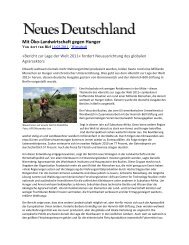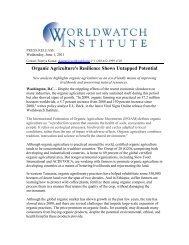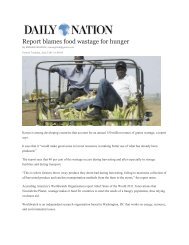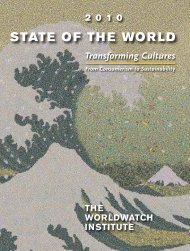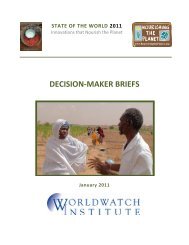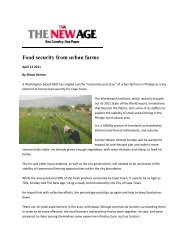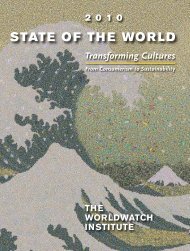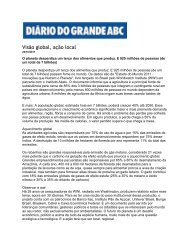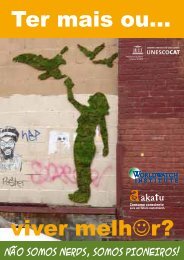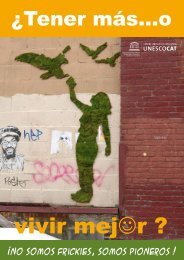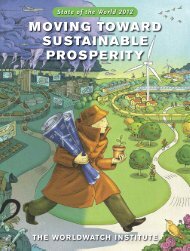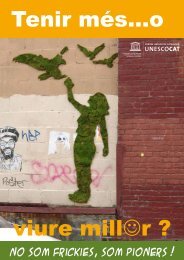Early Childhood Education to Transform Cultures for Sustainability
Early Childhood Education to Transform Cultures for Sustainability
Early Childhood Education to Transform Cultures for Sustainability
You also want an ePaper? Increase the reach of your titles
YUMPU automatically turns print PDFs into web optimized ePapers that Google loves.
STATE OF THE WORLD 2010 <strong>Early</strong> <strong>Childhood</strong> <strong>Education</strong> <strong>to</strong> <strong>Trans<strong>for</strong>m</strong> <strong>Cultures</strong> <strong>for</strong> <strong>Sustainability</strong><br />
education <strong>for</strong> sustainability, if staff training in<br />
this field is rein<strong>for</strong>ced, and if parents and communities<br />
are involved in the process.<br />
In May 2007 an international workshop on<br />
the role of early childhood education in a sustainable<br />
society brought early childhood professionals<br />
and experts from 16 countries <strong>to</strong><br />
Gothenburg, Sweden. Participants recognized<br />
that there was a great deal in the traditions of<br />
early childhood pedagogies that aligns with<br />
education <strong>for</strong> sustainability, such as the interdisciplinary<br />
approach, the use of the outdoors<br />
<strong>for</strong> learning, learning through concrete experiences<br />
and real-life projects, and the involvement<br />
of parents and communities. A subsequent<br />
conference in Gothenburg in November 2008<br />
recommended that early childhood education<br />
should be conceived as a first step in learning<br />
<strong>to</strong> live sustainably, should be given more priority<br />
in policy development, should receive more<br />
resources, and should involve cross-sec<strong>to</strong>ral<br />
support and collaboration. 3<br />
It is important that the goals and content of<br />
early childhood curriculum be aligned with<br />
education <strong>for</strong> sustainability. In this exercise,<br />
environmental education is not the only component.<br />
In addition <strong>to</strong> fostering love <strong>for</strong> and<br />
respect <strong>to</strong>ward nature and promoting an awareness<br />
of problems due <strong>to</strong> unsustainable lifestyles,<br />
early childhood education must encourage the<br />
outlook and basic skills that enable children <strong>to</strong><br />
take in<strong>for</strong>med actions responsibly. Instead of<br />
the 3Rs of reading, writing, and arithmetic,<br />
early childhood education can follow the 7Rs—<br />
reduce, reuse, recycle, respect, reflect, repair,<br />
and responsibility:<br />
• Reduce is about reducing the consumption<br />
of food, materials, and resources, which may<br />
involve working with parents on the problem<br />
of children’s exposure <strong>to</strong> advertisements promoting<br />
endless consumption.<br />
• Reuse is about showing children that materials<br />
can be used many times <strong>for</strong> different purposes<br />
in preschool and at home.<br />
• Recycle can be encouraged by asking children<br />
<strong>to</strong> bring recyclable materials <strong>to</strong> school and<br />
integrating them in<strong>to</strong> a range of activities.<br />
• Respect is about nurturing understanding of<br />
and respect <strong>for</strong> nature and natural processes<br />
and reducing the extent <strong>to</strong> which they are<br />
violated.<br />
• Reflect is a habit and skill everybody will<br />
benefit from in working <strong>for</strong> sustainability.<br />
• Repair involves taking care of broken <strong>to</strong>ys<br />
and other objects and repairing them.<br />
• Responsibility is about trusting children <strong>to</strong><br />
take care of something or do something they<br />
can feel proud about. 4<br />
There is much in the world that is unknown<br />
<strong>to</strong> children. Working <strong>to</strong>ward making the<br />
unknown visible <strong>to</strong> them means creating<br />
opportunities <strong>to</strong> discover the unknown in what<br />
they do and work with. This puts demands on<br />
early childhood teachers <strong>to</strong> be aware of what<br />
a child’s learning should be directed <strong>to</strong>ward. 5<br />
At the same time, there are also unknown<br />
phenomena <strong>for</strong> the teachers, particularly concerning<br />
the future. From a pedagogical perspective,<br />
this is a difficult challenge. One way<br />
<strong>to</strong> deal with this might be <strong>to</strong> try <strong>to</strong> identify<br />
what all children may benefit from having in<br />
the future. Eva Johansson suggests that<br />
courage, integrity, critical thinking, and responsibility<br />
are necessary personal attributes in<br />
order <strong>to</strong> be prepared <strong>for</strong> an unknown future.<br />
Also, it is important <strong>to</strong> nurture the ability <strong>to</strong><br />
recognize injustice, as well as <strong>to</strong> be skilled and<br />
creative in solving complex questions. If children<br />
are given ample opportunities <strong>to</strong> be challenged,<br />
<strong>to</strong> make mistakes, and <strong>to</strong> enjoy seeking<br />
possible answers, they will be better equipped<br />
<strong>to</strong> confront the complex questions raised by<br />
sustainable development. 6<br />
At the heart of teaching and working with<br />
young children should be the notion of the<br />
rich and competent child and active citizen,<br />
being in an equal position as his or her teacher,<br />
constructing understanding and meanings<br />
with others. The “project approach” is a teaching<br />
strategy that addresses children’s intellec-<br />
BLOGS.WORLDWATCH.ORG/TRANSFORMINGCULTURES 59



